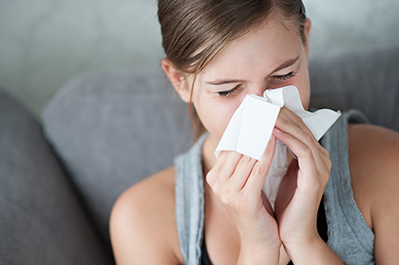Cough Treatment Options

A cough is a natural reflex action that occurs when foreign particles irritate your airways. It’s normal and healthy to cough from time to time, however, prolonged or forced coughing can irritate your lungs and cause sleepiness, dizziness, fainting, headaches, urinary incontinence, vomiting, or even broken ribs. If you have a cough that persists for several weeks, or one that brings up bloody mucus, this may indicate a condition that requires medical attention.
Whether you’re looking to ease your cough during the day or reduce it at night to get some much-needed sleep, read on for our guide to treating coughs and the kinds of cough treatment available.
Find out more about the different types of cough you could be suffering from.
How can I relieve a tickly cough?
During the day, you can help ease the tickle in your throat by sipping warm drinks. As well as helping to calm the tickle, drinking plenty of fluids will keep you hydrated, and the warmth will help reduce congestion. A cup of tea, warm squash or herbal teas are all good options.
You could also try drinking hot lemon and honey, it is believed to be a traditional cold remedy. You can make the mixture easily yourself by squeezing half a lemon into a mug of hot water and adding 1⁄2 teaspoons of honey. Never give honey to kids younger than 12 months, as it may cause a rare but dangerous condition called botulism.
Another option that can help calm a sore throat and numb the tickle for a while is sucking on an ice cube or an ice lolly. It's an effective form of relief – whatever the weather! – when used in conjunction with other treatments.
If you’re frustrated by the constant urge to cough at night, Night Nurse is available to help tame the tickle. Try Night Nurse Liquid or Night Nurse Capsules, both of which are designed to help knock out cold- or flu-related tickly coughs.
How can I relieve a dry cough?
A dry cough is a type of non-productive cough, so called because it doesn't normally produce phlegm. As the name suggests, it can make your throat feel dry, and continued coughing can be irritating. Products such as Night Nurse are available for the treatment of a cold- or flu-induced dry cough.
If a dry cough is bothering you, try breathing in steam. Steam can help keep your nose and throat from becoming too dry, which in turn eases the urge to cough. Use a steam vaporiser or fill a bowl with hot water and breathe in the steam. Alternatively, breathe in steam while you're having a hot shower.
As well as helping ease your dry cough, the moisture can aid your breathing and improve nasal and chest congestion.
How do I stop a dry, itchy cough?
A dry and itchy cough can sometimes be caused by an allergy. Common allergens include household dust, mould, pet fur, and environmental allergens like grass or tree pollen. Keeping your house clean and pets such as cats or dogs out of bedrooms, along with switching from carpet to hardwood floors, can help keep household allergens at bay. Dust mites can easily infiltrate soft furnishings and bedding, so change and wash your bedding regularly.
A dry and itchy cough can be made worse by smoking or being in smoky environments. Try to avoid breathing in smoke, as this can irritate your throat and make you cough more.
If your dry, itchy cough seems to be the result of having a cold or the flu, then Night Nurse products are a good option to help ease your discomfort at night. Find out where to buy Night Nurse.
How can I stop coughing at night?
After a long day, when all you want is to get some sleep, it's undeniably frustrating being kept awake by a cough. And getting a decent night's sleep is especially important when you're fighting off a cold or the flu, as your body needs sleep to aid your recovery.
Before going to bed, try a salt water gargle. It's an old-fashioned remedy but can help soothe a sore throat, loosen mucus, and reduce your need to cough. Pop half a teaspoon of salt into a glass of warm water and stir to dissolve. Gargle with the solution for a few minutes, then spit it out rather than swallowing.
Sometimes a cough can be made worse at night by lying flat in your bed, as mucus will collect at the back of your throat and make irritation more likely. You can also be affected by a post-nasal drip, which can make you cough more. To remedy this, try propping yourself up in bed with an extra pillow so that your head is slightly elevated.
Cough treatment to help you sleep at night
To help ensure a good night’s sleep when suffering with a cold or the flu, consider Night Nurse Liquid or Night Nurse Capsules, both of which are specifically designed to be taken at night, to aid restful sleep.
Find out more about how to manage and treat a cough at night.